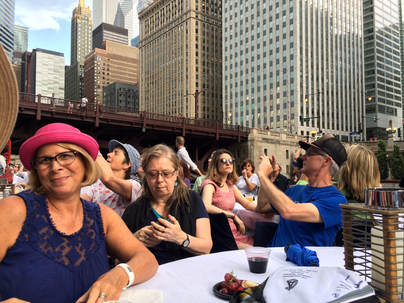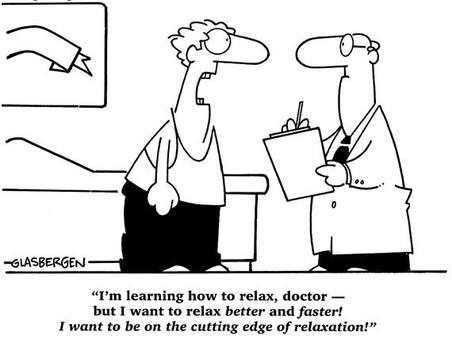
Ah, my “favorite” cocktail party/elevator/on the street question...
Recently, I had lunch with my friend Rebecca. She inspired me to do a series here on the basic tenets of AT, to help newer subscribers learn exactly what the AT is, and why they might like to take a class or have a lesson with me.
What I say over on my website AT introductory page is this:
“Developed over a hundred years ago by F. M. Alexander, the Alexander Technique (AT) is a hands-on approach to understanding human alignment. Applying AT principles leads to more reliable sensory perception, body awareness, and movement that is easier, more dynamic and much more enjoyable. The Alexander Technique is an educational process which teaches the student how to identify and undo poor and inefficient habits that may be causing stress and fatigue.”
Which is very definitely not what you say to someone at a cocktail party unless you want them yawning in their drink. Certainly it’s unlikely to spark their interest in coming into the studio. It’s all perfectly factual, and to be honest, pretty boring.
It turns out that a lot of Alexander Technique teachers have a hard time describing what we do in an engaging, short, grab-your-attention sentence.
So, perhaps what I’d like to say here, instead of another stock definition, is what the Alexander Technique has meant to me, and why I love to practice and teach it.
The Alexander Technique is all about expanding awareness of yourself, and your particular place in and of the world. It unites you physically, mentally, and in a greater sense, “sensually” with all that is in your environment. Alexander Technique gets me out of my head, and into where I am, right now. It helps me figure out “how” I am right now, as well. For example, after I typed the last sentence, I paused. I looked up from the computer screen and out the window. It’s a gorgeous day, and the leaves are a brightly lit shade of avocado green. How nice to see that. I sensed my sit bones on the chair, and realized I was leaning precipitously off to my left side, which always makes my back hurt when I do it unconsciously for a long time at my desk. Imagine that – I know exactly what makes my back hurt when I do it for a long time. And more importantly, I know how to stop doing it. I get to make a choice to do something different; I get to bring myself back into my environment and sense the air from the ceiling fan and how nice that is on my back, mimicking the breeze I see outside in the trees. I think “up”, breathe in, and notice my back expanding and my head gently resting on top of my spine. I feel refreshed, alert, and ready to get back to work. And that, friends, is the Alexander Technique in a nutshell.
Sometimes people think Alexander Technique is about changing your posture for pain relief. And it can be. That’s why I got started, like so many others who come to the work. But that is so superficial, so the tip of the iceberg. Yes, I can give you extremely practical tips and ideas for pain relief and for changing the way you stand and move. But friends, there is so much more available to you in this work.
This “little bit of nothing”, as Marjorie Barstow used to say, has saved me from a lifetime of upper back pain and from constantly trying to be onto the next thing instead of being where I am, and has taught me to listen.
I am a much better conversationalist than I was in my thirties, that’s for sure. Now, when I choose to, I consciously listen without worrying about my next response, or what I “need” to say. Wow – I think I used to miss a lot hanging out in my own head. Sometimes I still do, because I’m human, and perfection eludes me. But, hey, I really like listening. And when you come into the studio, I hope you feel listened to. And heard. Because that’s my job – but it’s also my pleasure. That, too, my friends, is the Alexander Technique.
I used to hurry, a lot. In my life as an elementary teacher, I had 20 minutes for lunch and virtually no time, ever, for a bathroom break. So everything was done as fast as possible – eating, drinking, bodily functions, copying papers, you name it. And I think I was often that way with the children, too – trying to cram every single bit of knowledge I had about a subject into their brains in 30 minutes or less, twice a week, with my head in their faces and with me bent over like a pretzel. I had 8 half-hour classes a day - four back to back in the morning, and four back to back in the afternoon. It was exhausting. I was an expert at something FM Alexander called “end gaining,” which is basically the fine art of being at the finish line before the start whistle has been blown. When we’re end gaining, we have no time to listen, to notice, to be aware, to slow down.
I started my Alexander Teacher Training in earnest during the last five years of my school teaching career. And it was fascinating to me to watch things slowly shift. Slowly. But little by little, I got the hang of not already being mentally at the photocopier while I was walking down the hall to the faculty room. I started to notice people in the hall. And kid’s art on the walls. And what was outside the windows. And you know what – it didn’t slow me down at all. I just got there as a whole, friendlier person, instead of a floating head with tunnel vision. What a revelation.
The last couple of years, I even slowed down my teaching in the classroom – giving children more time to respond, to pause, to think before calling out or even raising a hand before they had an answer. We are so conditioned as a society to get faster, to play that video game of life, to get that reward, to be “right.” We train children to do this, and we train them well. What would happen if we didn’t? Well, what I found was that the children answered questions far more accurately and completely when they had time to think before answering. And I’m not talking a long time. I actually just made them wait until I had counted to 5 before raising their hands. Five seconds. That’s all. It was amazing. Try it for yourself. Notice what happens when you pause for five seconds before answering.
People in general, however, are not usually interested in slowing down. As I have also personally experienced, we discover the need to slow down when a crisis happens – a physical or mental health “life event” that makes us pause, re-evaluate our lives, and learn to take some time for self-care. That’s often when people come to the Alexander Technique. That’s another thing we’re here for. Those people “get it.” And they’re ready for what we have to offer, an experiential alternative to all that rushing through life.
If you think you’re ready, come find me. And even if you’re not – if this intrigues you the least little bit, come take a class with me. Have the experience of trying Alexander Technique for yourself. If you like it, private lessons are available. And if you really, really, like it, I can get you ready for a teacher training program in AT.
That’s fun.
I like to think I teach with a sense of gentleness, humor, and kindness. I know that what I do changes lives, if you’ll let it.
Next time – Part 2: Breaking it down. What is Awareness?

 RSS Feed
RSS Feed